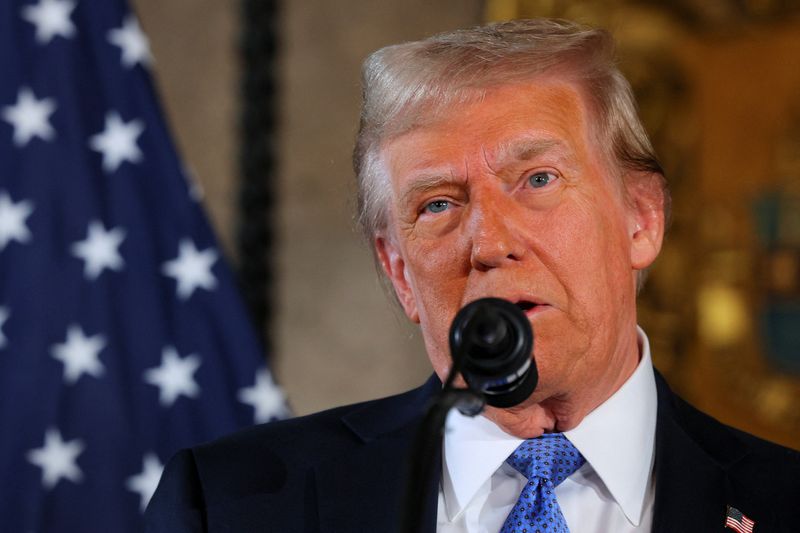By Helen Coster and Jack Queen
NEW YORK (Reuters) – President-elect Donald Trump on Monday stepped up his legal threats against news outlets and said he would also consider suing social media influencers and others for defamation, two days after ABC News agreed to settle a lawsuit with him.
“It costs a lot of money to do it, but we have to straighten out the press,” Trump told reporters at his Mar-a-Lago resort.
Some legal experts say Trump’s comments and legal actions risk chilling news coverage of the incoming administration even if legal protections for journalists are for now robust.
“There is some serious concern that the erosion of legal protections could lead to less aggressive news coverage,” said Syracuse University communications professor Roy Gutterman.
He pointed to the ABC settlement as a possible example of a news organization fearing retribution from the Trump administration, noting that the high cost of litigation could have also influenced the network’s decision.
On Dec. 14, Walt Disney-owned ABC News agreed to give $15 million to Trump’s presidential library to settle a lawsuit over comments that anchor George Stephanopoulos made on air.
The comments involved the civil cases brought against Trump by writer E. Jean Carroll, who accused Trump of sexually assaulting her at a New York department store in the 1990s.
Stephanopoulos said Trump was found liable for rape, but a jury found Trump liable for sexual abuse. New York law distinguishes the two offences.
Trump is appealing the jury verdict in that case and a judge’s ruling in a related lawsuit brought by Carroll.
An ABC News spokesperson said in a statement that the network was pleased that the parties reached an agreement to dismiss the lawsuit.
As part of the settlement, ABC agreed to publish an editor’s note stating that the network and Stephanopoulos “regret statements regarding President Donald J. Trump” made during the interview in question.
In his remarks to reporters on Monday, Trump threatened to sue the Des Moines Register over a poll the paper oversaw, which showed Democratic Vice President Kamala Harris leading Trump in Iowa shortly before Election Day.
Trump said of the poll, “it was a fraud and it was election interference.”
Des Moines Register spokesperson Lark-Marie Anton said in a statement that the paper has acknowledged the poll did not accurately reflect Trump’s ultimate margin of victory but stands by its reporting and believes a lawsuit would be meritless.
On Monday Trump also mentioned his lawsuit against CBS News over an interview with Harris that aired on its “60 Minutes” news program in October. The lawsuit, which seeks $1 billion in damages, claimed that the interview had been deceptively edited.
CBS has said the suit is “completely without merit” and has asked a judge to dismiss the case.
Trump claimed on Monday that “60 Minutes” participated in ”fraud and election interference.”
TARGETING LEGAL PROTECTIONS FOR JOURNALISTS
Any lawsuits by Trump would still face steep hurdles in court because U.S. law has some of the strongest protections in the world for news coverage of public figures.
Longstanding legal precedent holds that public figures must prove defendants knew or strongly suspected something was false but said it anyway, a standard known as “actual malice” that is notoriously difficult to prove in court.
Trump has said this legal standard should be changed, and some U.S. Supreme Court justices have expressed willingness to reexamine the precedent.
“The standard remains a strong one, the strongest in the western world,” said Boston School of Law professor Jeffrey Pyle.
Even if lawsuits by Trump were to fail, they could create headaches for news organizations by publicly revealing potentially embarrassing internal communications and exposing journalists and executives to depositions.
In the ABC lawsuit, some legal experts said the network could have prevailed because Stephanopoulos’ comments appeared to be an innocent mistake and not the type of reckless disregard that Trump would have to prove.

A judge denied ABC’s motion to dismiss the case in July, rejecting the network’s claim that it was broadly protected under Florida laws shielding news organizations from liability for accurate reporting on information received from government officials.
That order only concerned several initial legal questions and did not mean Trump would have ultimately won.


